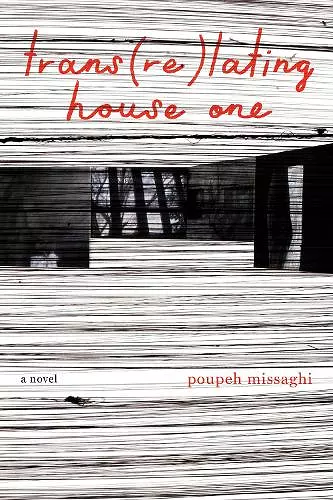trans(re)lating house one
Format:Paperback
Publisher:Coffee House Press
Published:19th Mar '20
Currently unavailable, our supplier has not provided us a restock date

Disappearing statues, missing protestors, inexplicable deaths—how does a writer account for Tehran’s shifting vanishing points?
In the aftermath of Iran’s 2009 election, a woman undertakes a search for the statues disappearing from Tehran’s public spaces. A chance meeting alters her trajectory, and the space between fiction and reality narrows. As she circles the city’s points of connection—teahouses, buses, galleries, hookah bars—her many questions are distilled into one: How do we translate loss into language?
Melding several worlds, perspectives, and narrative styles, trans(re)lating house one translates the various realities of Tehran and its inhabitants into the realm of art, helping us remember them anew.
Praise for trans(re)lating house one
A Library Journal Best Debut Novel of Fall 2019
A Millions Most Anticipated Book of 2020
“An ambitious, important book, erudite and anguished, about the role of writer as witness.” —Kirkus
“Missaghi’s lyrical, meditative debut merges fiction, poetry, and critical study to explore Iran’s history and volatile present. . . . a bravura exhibition of writing as performance art.” —Publishers Weekly
“Missaghi writes in a distinctively lyrical and meditative voice that often feels like prose poetry. . . . Astonishing reading for the sophisticated.” —Library Journal
“Missaghi. . . uses a fragmented style, veering from journalism to magical realism, to tell a fragmented story that produces no answers, only questions: ‘Will the trauma ever stop being inherited? Will humans ever change?’” —The Millions
“Written with an eye to probing human experience, cracking open the English language, and portraying life in the U.S. and Iran with a crisp honesty.” —Ploughshares
“Missaghi asks the reader to pay attention to how each text segment juxtaposes with surrounding segments and informs the work as a whole. . . . by engaging in the process of reading her book, we are creating our own map of the city’s story.” —Colorado Review
“A haunting political cartography, trans(re)lating house one is an evocative hybrid novel about the struggle to map the scars of our dead and disappeared.” —Azareen Van der Vliet Oloomi
“poupeh missaghi has fashioned a novel that bears clear-eyed witness and calls into question the act of witnessing, that beautifully renders a time and a place and interrogates whether such an endeavor is possible at all.” —Laird Hunt
“This is a rare and remarkable book.” —Daniel Borzutzky
ISBN: 9781566895651
Dimensions: unknown
Weight: unknown
296 pages